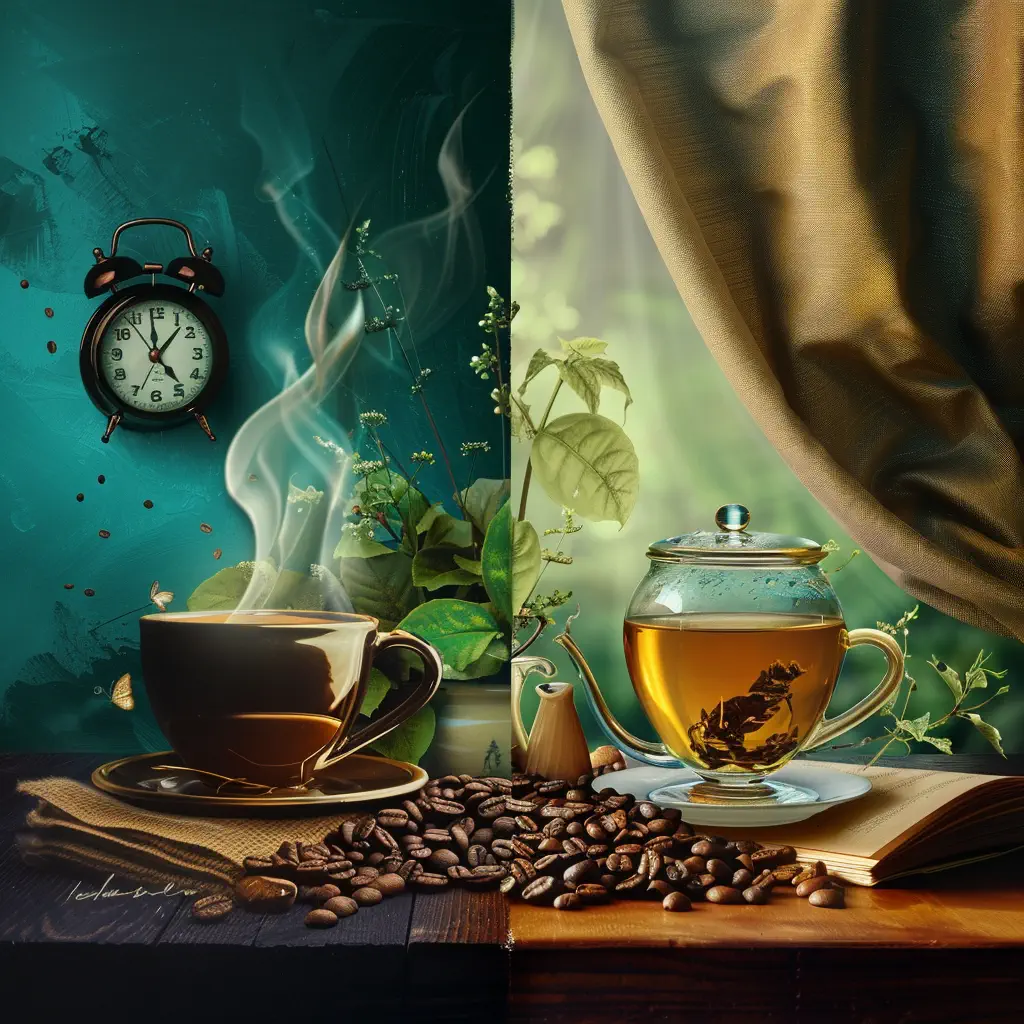Turning Over a New Leaf: Why I Swapped Coffee for Herbal and Green Tea
Dive into the details below and see the differences for yourself:
| Characteristic | Herbal Tea | Green Tea | Black Tea | Decaf Coffee | Regular Coffee |
| Main Components | A variety of herbs, flowers, fruits, and spices. No caffeine except for some specific plants. | Camellia sinensis leaves. Contains caffeine and antioxidants like catechins. | Fully oxidized Camellia sinensis leaves. Higher caffeine than green tea, antioxidants. | Coffee beans with most of the caffeine removed. Contains antioxidants. | Coffee beans. High in caffeine and contains antioxidants. |
| Caffeine | Usually caffeine-free, except for teas like yerba mate. | 30-50 mg per cup. | 40-70 mg per cup. | 2-5 mg per cup. | 95 mg per cup. |
| Flavor Profile | Wide range, from sweet or fruity to earthy or spicy, depending on the blend. | Light, fresh, and grassy to vegetal, depending on processing and brewing. | Robust, bold, and rich, with a stronger flavor than green tea. | Similar to regular coffee but slightly milder due to the decaffeination process. | Rich and robust, varies widely with the type of coffee bean, roast, and brewing method. |
| Health Benefits | Depends on the ingredients but can include relaxation, digestion aid, and immune support. | High in antioxidants, supports heart health, may aid weight loss, and reduce cancer risk. | Antioxidants can promote heart health and reduce stroke risk. Caffeine can enhance alertness. | Lower caffeine option, some antioxidant benefits, reduced risk of caffeine-related side effects. | High in antioxidants, can enhance alertness, may reduce risk of certain diseases. |
| Pros | Wide variety to suit different tastes. Non-caffeinated options are great for hydration and relaxation. | Antioxidant-rich, lower caffeine than black tea or coffee, may boost metabolism. | Stronger flavor and caffeine boost, may improve mental alertness. | Lower caffeine, less likely to cause jitters or interfere with sleep. | Strong energy boost, high antioxidant content, may improve mental and physical performance. |
| Cons | Lack of caffeine might not be suitable for those seeking an energy boost. | Some people may be sensitive to its caffeine content or experience bitterness. | Higher caffeine can cause jitters or disrupt sleep in sensitive individuals. | The decaffeination process can reduce flavor complexity and remove some beneficial compounds. | Can cause jitters, anxiety, and disrupt sleep in sensitive individuals. High caffeine content. |
| Potential Issues | Some herbs may interact with medications. Always check for contraindications. | Overconsumption can lead to caffeine-related side effects. | Can stain teeth more significantly than other teas. Overconsumption may lead to caffeine-related issues. | Some people might miss the full "coffee" experience due to altered flavor and reduced caffeine. | Overconsumption can lead to caffeine dependency and withdrawal symptoms. |
| Antioxidants | Varies with ingredients; some are high in specific antioxidants. | High, particularly catechins. | High, different types compared to green tea. | Similar to regular coffee but some antioxidants may be lost during decaffeination. | High, including chlorogenic acids and melanoidins. |
| Effects on Cholesterol | Generally neutral, but depends on specific ingredients. | May have a neutral to positive effect on cholesterol, especially with filtered types. | Unfiltered types may raise cholesterol levels due to diterpenes like cafestol and kahweol. | Generally neutral, especially filtered types. Lower cafestol and kahweol content than regular. | Unfiltered coffee (e.g., French press, espresso) can raise cholesterol levels. |
| Diuretic Effect | Depends on specific herbs; generally low to none. | Mild diuretic due to caffeine content. | Moderate diuretic due to higher caffeine content. | Mild diuretic, less than regular coffee due to lower caffeine content. | Moderate to strong diuretic due to high caffeine content. |
| Effects on Stress | Many herbal teas contain ingredients known to promote relaxation and reduce stress, like chamomile. | Can reduce stress at lower doses due to L-theanine but may increase it at higher doses due to caffeine. | Can increase alertness but might increase stress levels in sensitive individuals due to caffeine. | Lower caffeine might reduce potential for stress increase compared to regular coffee. | High caffeine can increase stress and anxiety in sensitive individuals. |
| Effects on Sleep | Herbal teas, especially those with ingredients like chamomile or valerian, can promote better sleep. | May affect sleep quality negatively if consumed late in the day due to caffeine. | Likely to affect sleep if consumed in the afternoon or evening due to higher caffeine content. | Less likely to affect sleep due to very low caffeine content, making it a better evening option. | Likely to disrupt sleep, especially if consumed in the late afternoon or evening. |
| Acidic Effect | Generally low acidity, making it gentle on the stomach. Specific herbs may vary in acidity. | Mildly acidic, but usually less so than coffee, making it easier on the digestive system for most people. | Mild to moderately acidic, similar to green tea but may be slightly harsher on the stomach than herbal teas. | Still acidic, similar to regular coffee, but some may find it slightly less irritating due to lower caffeine content. | High in acidity, which can cause stomach discomfort or acid reflux in sensitive individuals. |

